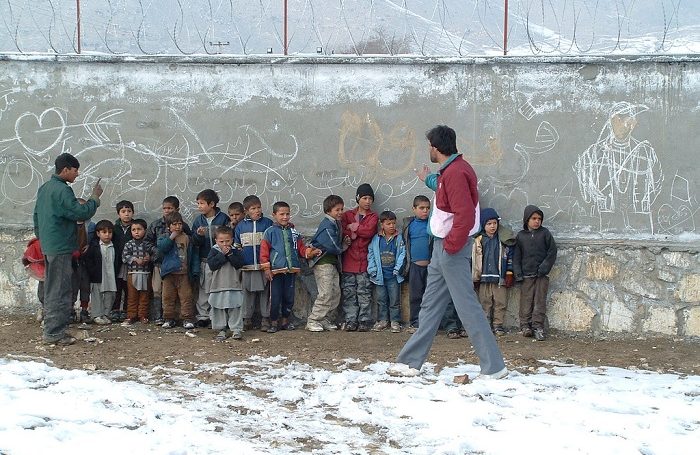
International Relations has come comparatively late in the game to the study of forced migration. Traditional concerns with the waging of war and the making of peace left relatively little room for a focus on individuals who fall through sovereignty’s cracks and wander the international landscape in search of protection and a new state to call home. The same cannot be said, however, for political theory – a field which has long been concerned with what legal and political “anomalies” reveal about the concepts and structures that we take for granted. The development of the current refugee crisis has brought the insights of one political theorist in particular – Hannah Arendt – back to the foreground.
The first political theorist to link the creation of refugees to the logic inherent in the nation-state as a unit of political organisation, Arendt was herself a refugee. Her reflections on the refugee problem in 1930’s Europe, written in 1951, have an eerie resonance with the refugee problem today, both in state treatment of refugees and the impact they had on state relations in Europe.
While much of Arendt’s analysis concerns the reason why the creation, and collapse, of nation-states has a tendency to create refugees, her reflections on what happens once they exist is of particular interest. The rapid increase in the numbers of refugees in the 1930s revealed a crisis at the heart of the system of human rights that had remained hidden until the emergence of mass displacement. As soon as groups of individuals appeared en masse who no longer belonged to a state willing to guarantee their rights, and sought refuge abroad, they were met with borders, internment camps, and the police. The paradox that these refugees revealed at the heart of the system of rights was that what had been conceived as human rights were in fact only the rights of citizens, and the nation-state system was incapable of protecting the rights of non-nationals.
When refugees fleeing persecution were not immediately turned back at the frontiers, or smuggled back across the border by the police in the dead of night, they were kept in internment camps, fed, clothed and sheltered by charities. Arendt characterised these policies of internment and enforced return as motivated by one question: “how can the refugee be made deportable again?” When they couldn’t be deported they were kept in camps – “the only practical substitute for a non-existent homeland […] the only ‘country’ the world has to offer the stateless.” But importantly, for Arendt, this problem was not a problem of geographic space but of political organisation. It is the logic of sovereignty as embodied in the nation-state that created refugee flows and represented the single largest barrier to rights protection for the displaced. But even sovereignty was not immune from the problems caused by state responses to refugees. Theoretically, Arendt tells us, sovereignty is nowhere more absolute that in matters of immigration, nationality and expulsion, but one state’s full exercise of their sovereign power to exclude necessarily infringes upon a neighbouring state’s sovereign right to choose who to allow in. And so the deportations that swept across Europe had the paradoxical result of undermining the institution of sovereignty of European states precisely in its own exercise. Whereas the “silent acknowledgement of common interests” had, until then, restrained this full exercise of national sovereignty, under the weight of mass influxes of refugees European states abandoned the “spirit of unorganised solidarity and agreement that had prevented any government’s exercise of its full sovereign power.”
65 years after these reflections, in the absence of any substantial resettlement scheme, the only practical substitute for a non-existent homeland that the world has to offer those fleeing from Syria today are still refugee camps. Some, such as Zaatari, in Jordan, are well organised, and relatively well-resourced. Others such as The Jungle near Calais, or Idomeni near the Macedonian border, lack electricity, basic sanitation, resources, and adequate shelter. Each time refugees try to move on from such camps they are confronted by a new border fence guarded by riot police. The closure of migration routes across Europe, and the erection of border fences, traps refugees within states who neither want them nor are capable of protecting them. NATO has deployed ships to the Aegean sea, not to rescue migrant boats, but to turn them back to Turkey. The EU and Turkey have agreed the principles of a deal which would see mass deportations from European states back to Turkey, in exchange for carefully selected refugees, in a move that the UNHCR has expressed grave concerns about. And the European project appears to be teetering on the brink of collapse, as solidarity and the acknowledgement of common interests once again seem under threat from the resurgence of nationalism and the exercise of sovereign powers to exclude.
As Arendt so eloquently wrote in 1951
neither physical safety – being fed by some private welfare agency – nor freedom of opinion changes in the least [the refugees’] fundamental situation of rightlessness. The prolongation of their lives is due to charity and not to right, for no law exists which could force the nations to feed them.
Despite the signing of the Refugee Convention and the proliferation of human rights treaties since the time Arendt wrote these reflections on the refugee crisis in 1930s Europe, we still have not addressed the fundamental problem inherent in the international system: that emigration is a matter of human rights, while immigration is a matter of sovereignty.
Further Reading on E-International Relations
- Opinion – Refugee Hierarchy in Western Responses to the Ukrainian Crisis
- Women, Peace and Security after Europe’s ‘Refugee Crisis’
- Global Migration and Local Integration: The European Refugee Crisis
- New Book – Policy and Politics of the Syrian Refugee Crisis in Eastern Mediterranean States
- The Syrian Refugee Crisis and the Lebanese Response
- Egypt and the Syrian Refugee Crisis
